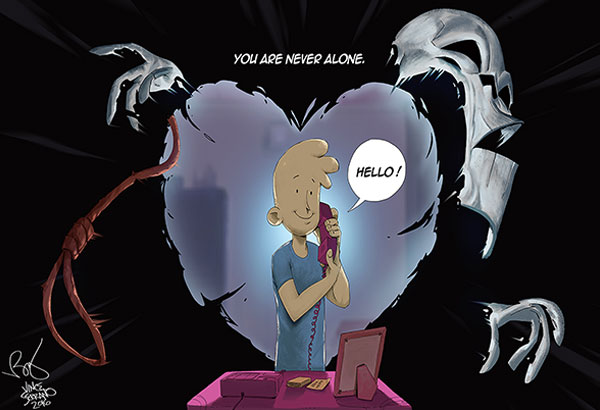Giving hope to the emotionally and mentally challenged


Christmas is supposed to be the happiest time of the year. We try to go with the flow and join the craziness and the commercialism but most importantly, show an upbeat spirit regardless of our true feelings. I am not embarrassed to show my sadness this holiday season. My friends know that I just lost two members of my family and forgive my absence in most of their social gatherings. But understand that I am not equating my sadness to depression. I may be sad, but not depressed. My sadness is caused by the loss of loved ones not by any other reason. Neither my brain chemistry or my sense of well-being is included in the equation.
Depression includes a broad spectrum of factors — with some, it is a mental condition, not only an emotional one. A psychologist once defined depression as a mood disorder that causes a persistent feeling of sadness and loss of interest in one's usual round of activities. Also considered a major depressive disorder or clinical depression, it affects how you feel, think, behave, and can lead to a variety of emotional and physical problems. A clinically depressed person may have trouble getting out of bed in the morning and doing normal day-to-day activities and sometimes feel that life is not worth living, leading to suicidal thoughts.
Statistics show that 37 percent in the corporate world suffer depression or severe anxiety but are functioning so that their officemates don't see any visible sign except for mood swings.
About 27 percent among the youth in schools and universities suffer depression, deep anxiety, and stress which result in enormous problems.
This is the reason why 10 years ago, Jeannie Goulbourn formed the Natasha Goulbourn Foundation after losing her own daughter. It was the first and only foundation that dealt directly with depression through an awareness campaign — with the very generous support of the Stanford Hospital and lectures given by top psychiatrists. The foundation was guided by top doctors headed by Dr. Ricardo Soler, Dr. Honey Carandang, Dr. Cornelia Banaag, and Dr. Eleanor Ronquillo. These good doctors wrote the manual for training responders who answer the hotline for people in deep depression and need help.
Five years ago, with Taos Puso Foundation as its major sponosr, Hopeline was created.
Hopeline is a portal to discussing with highly trained responders their feeling of helplessness, depression, and suicidal tendencies. It is not a counseling service, rather an intervention to suicide in some cases. The responders discuss the callers’ problems and suggest how to muster courage to face the problem and seek professional help.
One of the responders I talked to was Mila Rollinas who shared this story: A caller, Raul, 45, was in an LRT station, the Doroteo Jose Line, going to Monumento. He was waiting for a train and his plan was to jump and get run over by the train. He saw the poster of Hopeline, which is posted in all the LRT train stations. It had a telephone number, which he called. Mila answered and listened to his story. His wife left him and he was despondent, and he felt he had nothing to live for. Mila told him to think of the good memories he had of his wife, which triggered a lot of emotions in Raul. He cried and he screamed out his ill feelings to Mila, his listening ear. Meanwhile, Mila wrote instructions to her assistant to call the security of the station to warn him of a man who could jump when the train comes. After he poured his heart out to Mila, Raul was pacified and Mila was able to change his mind about killing himself. All he needed was someone he could talk to and pour out his frustrations. Mila made him promise to go to one of the psychiatrists/psychologists of Hopeline and seek professional help.
Mila, who is now Hopeline's operations manager had many more stories to share about suicide and depression cases triggered by broken relationships, women and young girls who are frequently sexually and physically abused, financial reversals, family and marital problems, bullying in school, gender identity crisis, health problems, unemployment problems. Rape is another major cause of depression leading to suicide.
Eighteen months ago, the Department of Health decided to sponsor Hopeline. The Natasha Goulbourn Foundation does the marketing through campus caravan talks, lecture awareness programs, and training of teachers, parents, students in wellness, and emotional resilience. Through the efforts and vision of Secretary Paulyn Ubial, Hopeline plans to have 30 responders soon and with some talking five dialects so they can serve OFW and other Filipinos abroad. They are trained during weekly sessions with psychologists and psychiatrists who also debrief them on how to improve their manner of responding.
Hopeline's primary mission is to bring depression to light through:
1. Education and information campaign on depression targeting students, the academe, mental health care providers, OFWs and their families.
2. Programs that train responders to man crisis hotlines.
3. Setting up a resource center housing a library, workshop, and consultancy rooms.
4. Partnerships with like-minded local and global individuals and organizations.
Values of Hopeline: Choose life. Live life.
Connectedness.
Hopeline had 13,947 calls in five years.
Their hotlines, which are in all their banners scattered all around the city and in all LRT stations, are: 804 HOPE (4673) and 0917-558 HOPE (4673),
2919 for Globe & TM subscribers; website: www.ngf-hope.org, tel. no. 897- 2217.



















